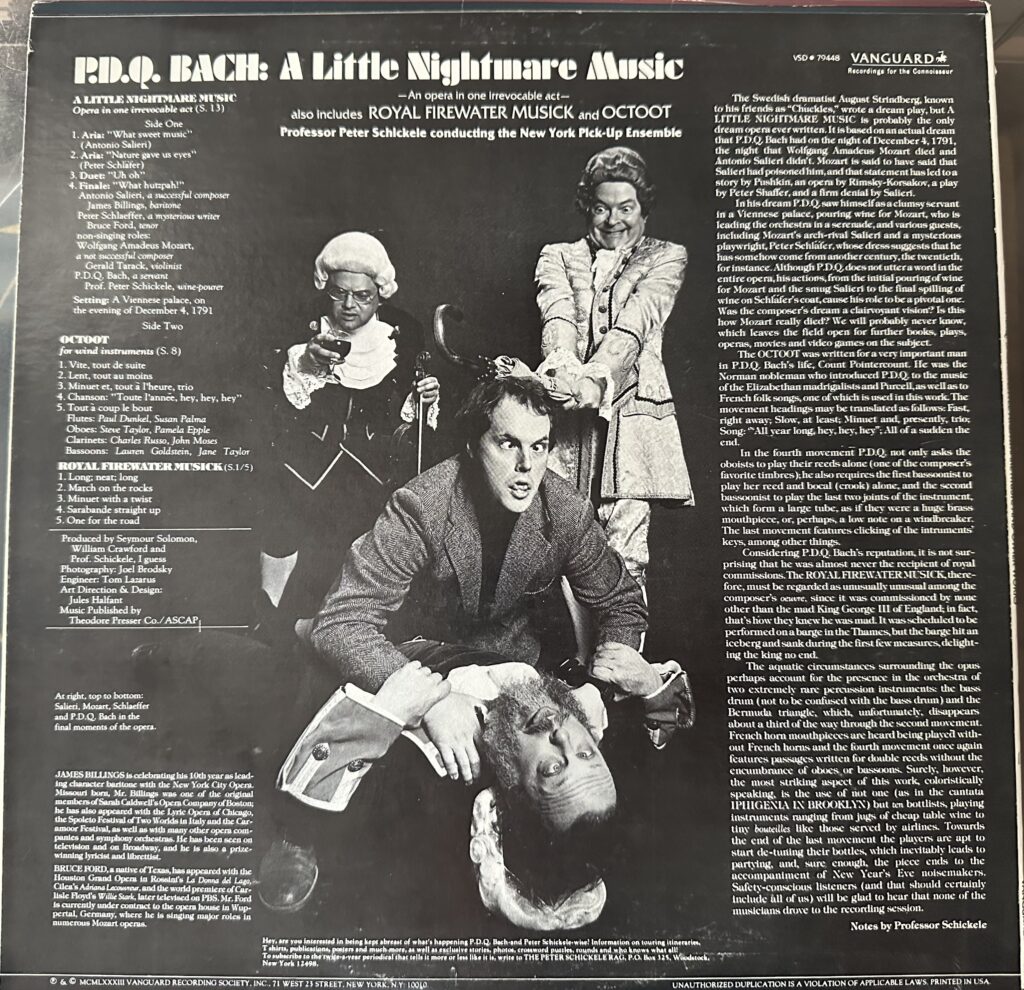
Album of the Week, June 8, 2024
No one can execute perfectly, every time, along the arc of a career. Shostakovich had Lady Macbeth of Mtsensk, which got him exiled. Mariah Carey had Glitter and Charmbracelet. And Peter Schickele had A Little Nightmare Music. It’s not that this, his last album for Vanguard Records, was bad, exactly; it’s just that the jokes don’t land.
Schickele was in a different place by 1983 when this album was released. The music was recorded in the studio, so didn’t have any “punch” from the audience laughing. Also, longtime collaborator and “bargain counter tenor” John Ferrante is not to be found on the recording. I used to wonder \ if he had died, but he was still performing later in 1983; a falling out? At any rate, his absence is felt.
(Ferrante would, in fact, pass away four years later, on May 28, 1987, so perhaps he was simply not well enough to record. I always find it sad that I have to search for that newspaper article; if any countertenor deserves a Wikipedia page, it’s him. Hmm…)
At any rate, hot on the heels of the 1979 Broadway production of Amadeus (and actually anticipating the theatrical release of the movie adaptation by a few months), which clearly inspired the cover art, we have “A Little Nightmare Music” (S.35), representing a purported actual nightmare of P.D.Q. Bach. In the dream, he was a servant at a meeting between Mozart, Salieri, and the mysterious writer Peter Schlafer, who appears by his dress to have come from another century, “perhaps the twentieth.” Schlafer irritates Salieri by casting aspersions on his compositional career and unfavorably comparing him to Mozart, and Salieri is finally enraged enough to pour poison into Schlafer’s wine—only to watch horrified as the buffoonish P.D.Q. trips and accidentally gives the poisoned wine to Mozart instead. There are recriminations and violence all around.
The actual work is composed almost entirely of the actual “Eine kleine Nachtmusik,” with vocal lines for Salieri (James Billings, baritone) and Schlafer (Bruce Ford, tenor) above. The lines are occasionally funny, but the burden of the plot and the lack of swerves into the rich nonsense that characterized some of the earlier P.D.Q. outings make it one of the lesser numbers in the Schickele catalog.
Which is a shame, because “Octoot” (S. 8) is a genuine riot. Written for a woodwind octet, the writing is sharp and funny, and Schickele brings back some of the brilliant instrumentation for which his best P.D.Q. numbers were famous. The writing for double reeds without the use of the oboes in the fourth movement “Chanson: ‘Tout l’année, hey, hey, hey” brings back a favorite P.D.Q. weird timbre, as does the requirement for the first bassoonist to play her reed and bocal alone and the second bassoonist to play the last two joints of the instrument by itself. And if you can get through the final movement, “Tout à coup le bout,” without reciting “Shave and a haircut” alongside the instrumentalists, you’re a better man than I am (Gunga Din).
The final composition, “Royal Firewater Musick” (S. 1/5), is five movements of more ambitious writing and orchestration. The first, “Long, neat, long,” seems as though it’s destined to play on indefinitely into the sunset, as what starts out as a nifty bit of imitative writing for the winds goes off the rails in its reprise, finally requiring a conductorial intervention to land. The “March on the rocks” is a more straightforward number, as is the “Minuet with a twist” (the twist is a massive blow on the gran cassa). The “Sarabande straight up” is an unexpectedly sweet melancholic bit of writing, or at least it would be without the solo parts for double reeds without the encumbrance of oboes or bassoons. In “One for the road” we find a rare bit of orchestral writing for ten wine bottlists, playing an assortment of sizes of wine bottles (and occasionally de-tuning the instruments). There is some virtuoso writing for the bottlists between all the other bits, including quotations from “Aloha ‘Oe” and additional solo parts for duck call. It’s a good choice to close the record, and the Vanguard chapter of P.D.Q. Bach.

Schickele would continue to record P.D.Q. Bach records after a six year hiatus, signing with the Telarc label and releasing six more studio albums, two compilations, and a live recording of newly discovered P.D.Q. music in the years between 1989 and 2007. Some of the individual works along the way were absolutely brilliant (“Einstein on the Fritz,” “Four Folk Song Upsettings,” “Lip My Reeds,” and Schickele’s own “Last Tango in Bayreuth,” which I think highly enough of to have put it on a mix years ago,) but some of the albums were unlistenable due to the run-amuck sketches that fight for time with the compositions (I’m lookin’ at you, WTWP: Classical Talkety-Talk Radio, though I have to admit that the central conceit, a relentlessly upbeat classical music station whose programming is literally WTWP, “wall to wall Pachelbel,” is kind of brilliant).
I remain disappointed that I never got to perform in one of Schickele’s performances; I would have given anything to get a group together to work on the “Missa Hilarious” or “Consort of Choral Christmas Carols,” or “The Art of the Ground Round.” It’s too late to collaborate with the man himself, who passed away on January 16, 2024, but I have the sheet music for some of his works somewhere in my basement. Hmmm…
You can listen to this week’s album here:
